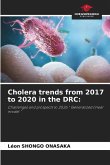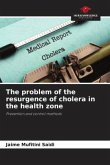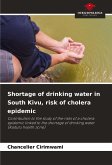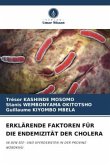Cholera is a serious, contagious intestinal toxic infection caused by the enterotoxin of V. cholerae serogroups O1 and O139 associated with major epidemics. This is a public health emergency. The various interventions implemented do not make it possible to control the disease. The surveillance system has been of little use because it does not fully contribute to the prevention and control of negative health-related events. Biological research should not only be limited to the human part. Ignoring the value of environmental monitoring will hinder the elimination of cholera and prevent the benefits of these services from increasing where the need is greatest. Indeed, the systematic determination of cholera sanctuary areas could be an essential approach to the establishment of effective and efficient cholera control programs. To effectively combat cholera, it is imperative to set up a surveillance system that takes into account aspects of One Health, given that vibrio cholerae behaves differently in inter-epidemic and epidemic periods.
Bitte wählen Sie Ihr Anliegen aus.
Rechnungen
Retourenschein anfordern
Bestellstatus
Storno








